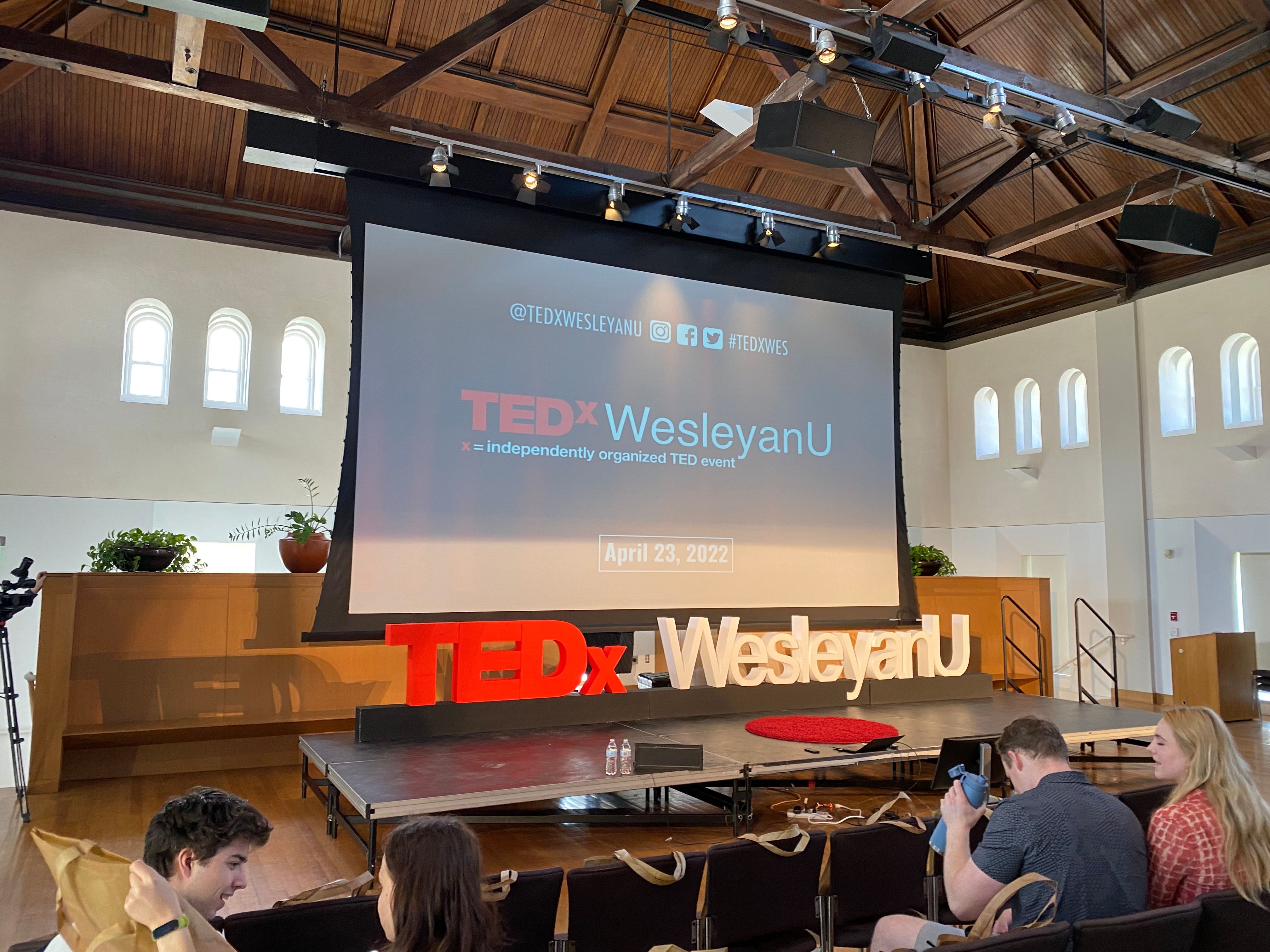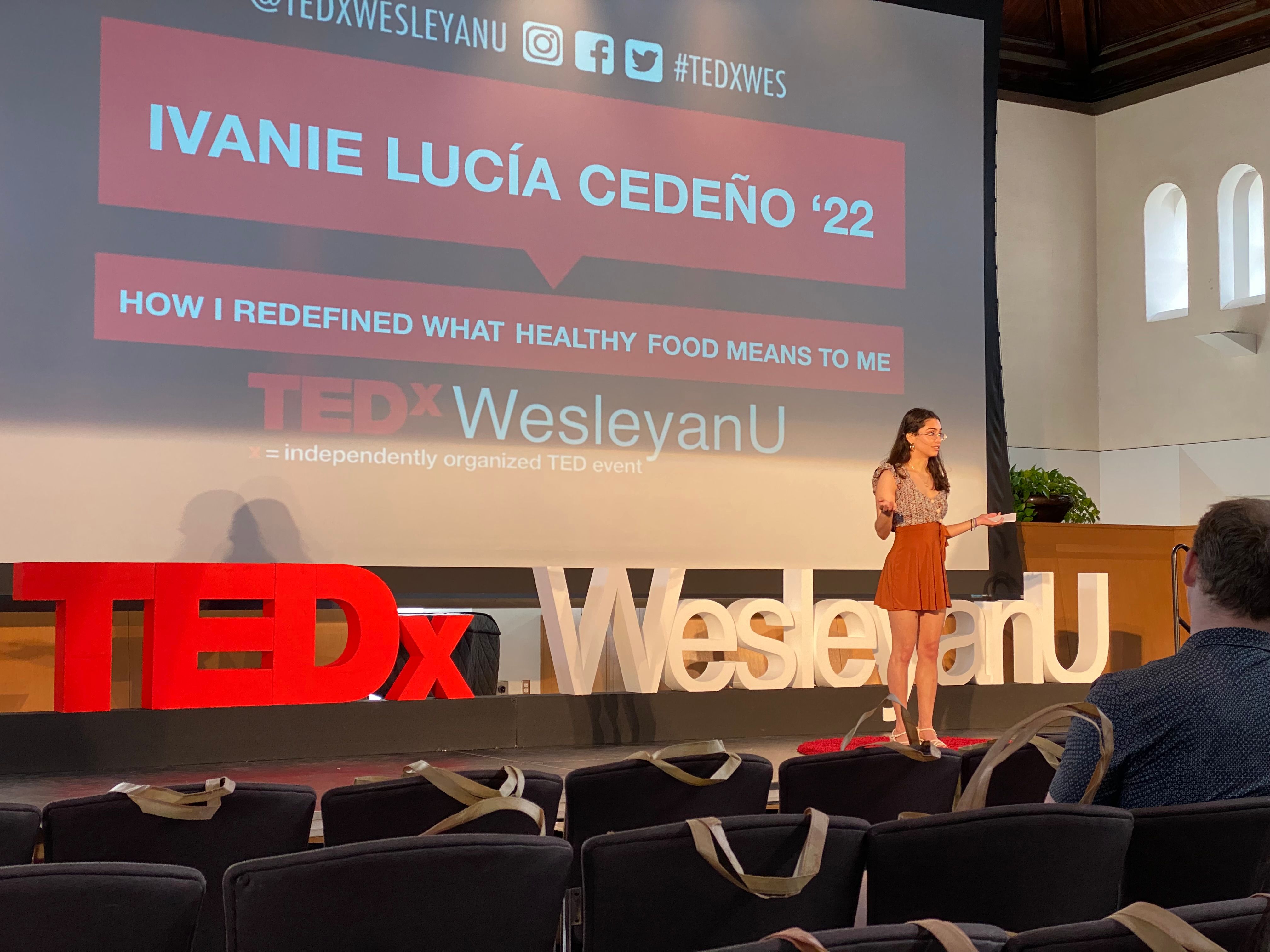
c/o Andrew Lu, Staff Photographer
TEDxWesleyanU hosted its first in-person conference since the beginning of the COVID-19 pandemic on Saturday, April 23 in Beckham Hall. The event saw nine different presenters speaking to approximately 200 audience members on the theme of the “Re-roaring ’20s,” an exploration of societal rebirth following the COVID-19 pandemic.
The speakers included producer and writer of “BoJack Horseman” Kate Purdy ’01; Vice President at American Express Christopher Frank; Founder and CEO of Roq Innovation Raquel Graham ’90; Head of Global Strategic Alliances at Google Paul Magnone; Global Entrepreneur and Plant-Based Food Innovator Ritu Chhatwal ’88; travel and children’s books author Brad Herzog P’25; mountain geographer, conservationist, and mountaineer and Menakka and Essel Bailey ’66 Distinguished Visiting Scholar in the College of the Environment Alton Byers; Bennington College President Laura Walker ’79 P’21; and student speaker Ivanie Lucía Cedeño ’22. The speakers addressed a number of topics, ranging from health advocacy to television screenwriting
Technology, Entertainment, and Design (TED) is an international organization that arranges conferences where several expert speakers are often invited to present on a specific theme. TEDx, by comparison, is independently organized by local institutions, often allowing for more individual creative freedom with conference programming. TEDxWesleyanU Licensee Catherine Cheng ’22 highlighted the timeliness of the event, specifically given the University’s evolving COVID-19 protocols this semester.
“The idea behind the theme was to capture the zeitgeist of the current time and celebrate the sense of re-opening that has accompanied this moment in the pandemic,” Cheng wrote in an email to The Argus. “We thought it was particularly applicable to campus opening up again and the general atmosphere of celebration and excitement as we reconnect.”
This year’s theme is personal to Cheng and her team because the TEDxWesleyanU conferences of the past two years have taken place online. While she is happy to be able to hold the conference in person, Cheng highlighted the challenges of organizing the event during the pandemic.
“Safety is our first priority, and so we have needed to adapt to ensure the safety of our speakers, compliance with University policies, and maintain the safety of our audience,” Cheng wrote. “We believe these extra measures are undeniably important, but it’s definitely been uncharted territory for the planning team as the situation seems to shift every few months.”
Many features of the TEDxWesleyanU 2022 conference reflected a return to normalcy. Following University protocols, this year’s event did not require attendees to wear masks. While many speakers gave presentations in person at Beckham Hall, the changing nature of the pandemic around the world made it difficult to have every speaker physically attend the event.
“One way that we’ve adapted is that this year we will be having two speakers join us virtually, as it was not safe to have them travel to be in person with us,” Cheng wrote. “We’re excited to see how the audience responds to this new medium.”
Although the speakers presented in a hybrid setting, Cheng emphasized TEDxWesleyanU 2022’s commitment to community building via the TED motto, “Ideas Worth Sharing.”
“We…like to use TEDx as an opportunity to bring the Wesleyan community together both across generations…as well as within the political context of campus to bring together speakers of different backgrounds, ideologies, perspectives[,] etc.,” Cheng wrote. “I think the diversity of our speakers and their topics reflects the diverse ideas within our Wesleyan community.”
Cheng explained that the process of selecting speakers begins every fall, when the TEDxWesleyanU team gets together to reflect on what the theme of the conference should be, who in the University community can contribute to that theme, and what perspectives they can offer at the conference. According to Cheng, the group then collaborates with the speakers to develop the talk itself and the speaker’s stage presence. The group then aims to pick a diverse lineup of speakers who will share unique perspectives on a variety of topics.
TEDxWesleyanU faced a few setbacks in the planning stages of this year’s conference. For example, when one of the conference’s original speakers had to drop the event a few weeks out, Byers was able to step in last-minute.
“I’ve been fortunate this year to have been in a position to speak at various faculty gatherings, local libraries, Middletown service organizations, and to also develop and teach a course on ‘Mountain Geography: Physical and Human Dimensions,’ so the TEDx event seemed like a wonderful opportunity to expand this outreach,” Byers wrote in an email to The Argus.
Byers spoke on glacial lake floods and how a scientific understanding of such ecological events can be strengthened through fieldwork, immediate data collection, interdisciplinary problem solving, and engagement with local communities. Much of the inspiration for his lecture came from his personal experiences in the high mountains. For Byers, the TEDxWesleyanU conference posed a unique chance to speak with the University and Middletown communities on issues many might not be familiar with.
“I wanted to share a few aspects of my own work in the world’s high mountain regions related to glaciers, climate change, and several of the new cryospheric hazards…that are directly or indirectly related to warming trends,” Byers wrote. “As there aren’t that many mountain geographers in Middletown, I thought it would be a great opportunity to communicate in more detail with the Wesleyan University community, especially its students.”
In addition to highlighting acclaimed speakers, TEDxWesleyanU encourages student participation. One way this is done is through a speaker competition, which begins with a written application in January, followed by a live pitch contest where students would share five minutes of their talks. Then three finalists delivered a full talk, after which Cedeño was selected as the winner of this year’s speaker competition.

c/o Andrew Lu, Staff Photographer
Cedeño’s presentation, entitled “How I Redefined What Healthy Food Means to Me,” centered on eating habits, her struggle with pinpointing her nutritional needs, and the harmful societal effects of diet culture. During her speech, Cedeño described how she came to reject the practices of modern health movements and acknowledged that her viewpoints might be contentious, but ultimately appropriate.
“I know that they give a lot of talks about…big ideas and…give people a platform to say these ideas, be it controversial or not,” Cedeño said. “I’m very passionate about food and…am going against what mainstream media is saying, which is like, ‘Veganism is so healthy for you!’”
Cedeño explained that her speech began to develop a more concrete narrative flow and message as it took shape. For Cedeño, the TEDxWesleyanU conference’s college-aged audience was an ideal sphere to share this message.
“Specifically for college students, I want them to rethink why they eat a specific way, why they eat at specific times, and how they eat what they eat,” Cedeño said. “I just want them to have these conversations of food, ’cause I feel like college students, we have a slippery slope of potentially falling into destructive behaviors or disordered eating patterns, just given our life here on a college campus…. So I don’t want them to let their eating fall through the cracks.”
Cedeño emphasized that her message was not one of anti-veganism or anti-health-foods, but rather one that takes a closer look at personal nutrition needs, ethical responsibility, and the role of food in an individual’s life.
Upon reflection, Cedeño emphasized the difficulty of confronting such a personal topic. However, she felt it necessary to share her experiences with others so that they could discover the foods that satisfy their physical, mental, and emotional needs.
“It was a very emotionally intense process for me to engage in, but I think ultimately it was worth it because I was able to speak my truth and at least help people start talking about their relationship with food,” Cedeño said. “I also want people to explore their cultural foods…[to] reclaim what their family is culturally tied to and engage in…what it feels like to eat your cultural foods.”
Despite grappling with COVID-19 complications, presenting nine speakers, and exploring several wide-ranging topics, TEDxWesleyanU succeeded in pulling off its first on-campus conference since 2019. Nevertheless, Cheng emphasized that online aspects were still vital to the group’s mission. Although delivered in person to 200 audience members, the presentations now have the opportunity to reach countless more viewers in the digital space.
“The really exciting thing about our association with TED is that we can find the ideas in our local Middletown and Wesleyan community that are worth sharing, and amplify them in an international scale,” Cheng wrote. “All TEDx talks are promoted through the official TEDx channels, which has over 23 million subscribers on YouTube. The opportunity to source and share local ideas on a platform this big is really unparalleled, in my opinion.”
Aaron Goldberg can be reached at apgoldberg@wesleyan.edu.
Sam Hilton can be reached at shilton@wesleyan.edu.